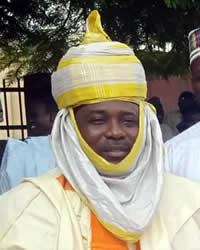Kakanda in Nigeria

Photo Source:
Anonymous
|
Send Joshua Project a map of this people group.
|
| People Name: | Kakanda |
| Country: | Nigeria |
| 10/40 Window: | Yes |
| Population: | 67,000 |
| World Population: | 67,000 |
| Primary Language: | Kakanda |
| Primary Religion: | Islam |
| Christian Adherents: | 2.20 % |
| Evangelicals: | 1.10 % |
| Scripture: | Translation Started |
| Ministry Resources: | No |
| Jesus Film: | No |
| Audio Recordings: | No |
| People Cluster: | Nupe |
| Affinity Bloc: | Sub-Saharan Peoples |
| Progress Level: |
|
Introduction / History
The Kakanda is an agricultural, Muslim people who live in west-central Nigeria. They are one of the subgroups of the larger Nupe peoples. The Kakanda speak their own language of Kakanda. Unfortunately, there are no Christian resources available in the Kakanda language at the present time. Kakanda is an endangered language since many young people prefer to speak the Hausa and English they learn at school. Many of the Kakanda are illiterate so the good news will be to be presented to them in audio and visual forms.
Where Are they Located?
Their traditional headquarter is Budon in Lokoja Local Government Area of Kogi state of west-central Nigeria. Other Kakanda settlements are Shevu, Asawa, Eppu, Ekeregi, Apata, Doji, Ankomi, Gori, and Ashe.
What Are Their Lives Like?
The Kakanda are influenced by the Hausa-Fulani culture, but the people have been able to preserve their heritage. Islam is prevalent and has altered the culture of the people significantly. The primary occupation of the Kakanda is agriculture. They live in rural villages surrounded by the land they farm. They grow rice, yams, millet, beans, maize, and vegetables. Peanuts, kola nuts, and palm oil are cash crops. The Kakanda buy things they are unable to make for themselves such as cell phones and appliances. Many families also raise goats and cattle for their milk, meat and hides. Chickens provide meat and eggs. Village elders settle legal disputes and promote their interests.
Most people groups in rural Nigeria like the Kakanda enjoy music, story telling and dance as a form of entertainment and communication. These art forms are very meaningful in rural Nigeria. Those who want to take the gospel to the Kakanda people would do well to use these art forms when presenting the gospel.
What Are Their Beliefs?
The Kakanda people are Sunni, the largest branch of Islam. They believe that the One, Supreme God, Allah, revealed through his prophet, Mohammed, and taught mankind how to live a righteous life through the Koran and the Hadith. To live a righteous life, you must utter the Shahada (a statement of faith), pray five times a day facing Mecca, fast from sunup to sundown during the month of Ramadan, give alms to the poor, and make a pilgrimage to Mecca if you have the means. Muslims are prohibited from drinking alcohol, eating pork, gambling, stealing, slandering, and making idols. They gather for corporate prayer on Friday afternoons at a mosque, their place of worship.
The two main holidays for Sunni Muslims are Eid al Fitr, the breaking of the monthly fast and Eid al Adha, the celebration of Abraham's willingness to sacrifice his son to Allah.
In most of the Muslim world, peoples like the Kakanda depend on the spirit world for their daily needs since they regard Allah as too distant. Allah may determine their eternal salvation, but the spirits determine how well we live in our daily lives. For that reason, they must appease the spirits. The often use charms and amulets to help them deal with spiritual forces. A tiny fraction of the Kakanda is Christian.
What Are Their Needs?
The Kakanda people need adequate rain for their crops and their livestock so they can live lives free of want and poverty. They need modern medical care and good schools that will help the next generation to thrive in a rapidly changing world. Solar panels can provide electricity for charging cell phones. The region where the Kakanda live is subject to violence from Boko Haram, the terrorist group. The Kakanda need peace to live a productive life. Most of all the Kakanda need to hear and understand the message of Jesus Christ. He alone can forgive their sins and get them right with the one, true God.
Prayer Points
Pray for God's kingdom to come and His will to be done among the Kakanda people.
Pray for a movement of Kakanda households to study the Bible and accept the blessings of Christ.
Pray for a spiritual hunger that will drive the Kakanda people to the arms of Jesus.
Pray for workers who are filled with the fruit and the power of the Holy Spirit to go to the Kakanda people.
Pray that the Lord sends Nigerian Christians to share the gospel with the Kakanda.